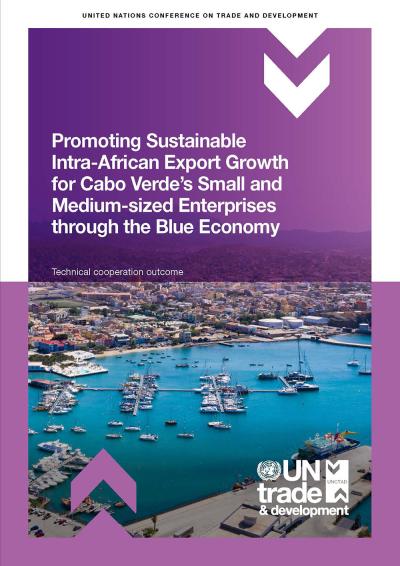
Cabo Verde — a small island economy subject to a fragile ecological system, natural hazards and the looming threat of climate change — can best safeguard and extend its social development progress by integrating it growth into a trade-based economy that respects the ecological boundaries of its islands.
Given its small domestic market size and structural trade deficit that marks the country’s external trade, expansion of exports, on both the intensive and extensive margins, will play a vital role.
In this regard, the African Continental Free Trade Area (AfCFTA) offers unique opportunities, particularly since Cabo Verde’s trade with the African region, especially ECOWAS, is very modest.
Additionally, global supply chains are experiencing headwinds following the COVID-19 pandemic, the ongoing war in Ukraine and the Middle East, and rising geopolitical tensions between the United States of America and China.
This report examines the economic and ecological challenges facing Cabo Verde in increasing goods exports, particularly from small- and medium-sized enterprises (SMEs) to the Africa region.
It analyzes the country’s dependence on tourism and fish (tuna) exports, highlighting the vulnerability of these sectors to a fragile environment, climate change and global economic shocks.
The report also explores the potential for expanding exports to other African countries through regional value chains, as well as developing a sustainable Blue Economy that leverages the country’s marine resources while protecting the environment and strengthening trade with other African countries.
To support these efforts, the report proposes a Blue Economy Entrepreneurial Ecosystem (BEE), a framework for supporting SMEs in Cabo Verde, and recommends specific policies for promoting sustainable development and economic diversification in a regional context.
Structure of the report:
- Section 2 examines the ecological boundaries within Cabo Verde, focusing on the ocean (blue) economy perspective and highlighting the vulnerabilities the islands face.
- Section 3 examines Cabo Verde’s trade and integration into global value chains (GVCs), particularly within the context of regional integration, especially within ECOWAS.
- Section 4 centers on identifying new opportunities for export expansion, particularly within the African region. It examines existing export patterns, analyzes potential unrealized export opportunities and explores the extent to which these opportunities are located in Africa.
- Section 5 introduces the concept of a Blue Economy Entrepreneurial Ecosystem (BEE) as a strategic framework for Cabo Verde to expand its exports, particularly in the context of the AfCFTA. This section argues that a robust BEE is essential for Cabo Verdean SMEs to capitalize on the country’s export potential while respecting its ecological boundaries.
- Section 6 proposes and measures Cabo Verde’s BEE. It identifies eight components of the BEE: financial capital, human capital, market size, ocean economy, maritime resources, business environment, governance, and resilience.
- Section 7: Conclusions and recommendations. Finally, this report comes to one of the central questions that it set out to answer: How can Cabo Verde best position itself so that its private sector, in particular the SME sector, can expand the country’s exports through trade integration with other African countries, in light of the AfCFTA?
This report was prepared under the UNCTAD project, Enhancing the capacity of African vulnerable countries in adopting policy incentives and innovative instruments for SMEs’ participation in regional value chains, financed by the 2030 Agenda for Sustainable Development Subfund under the United Nations Peace and Development Fund.


